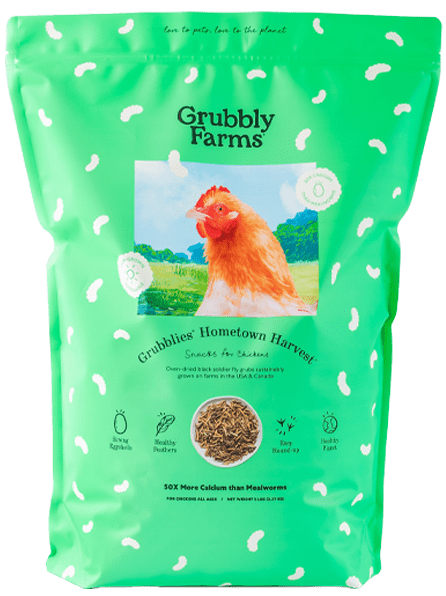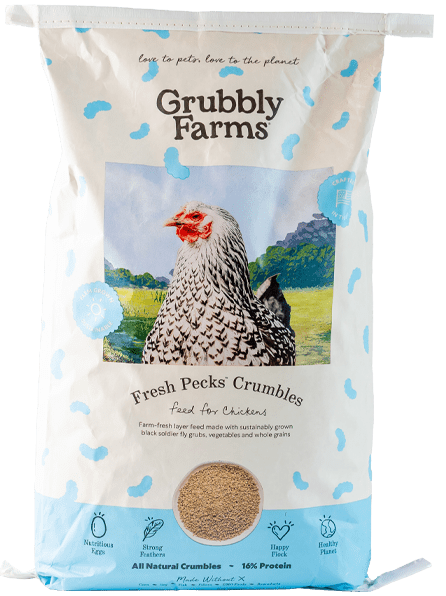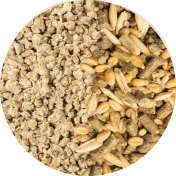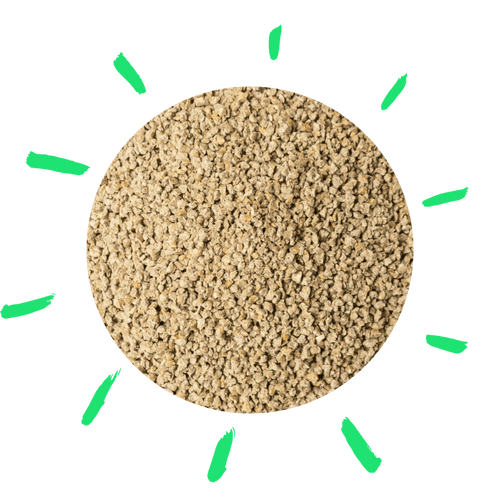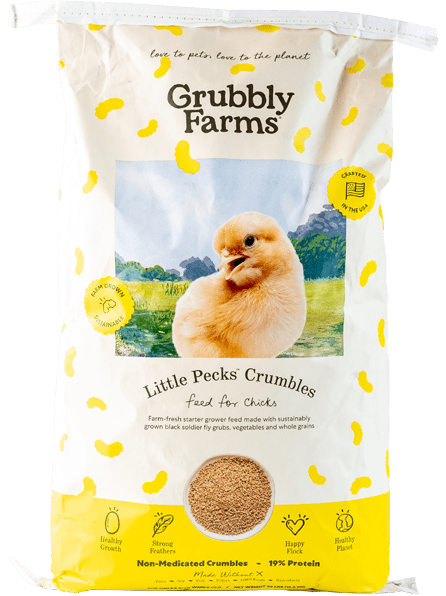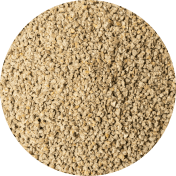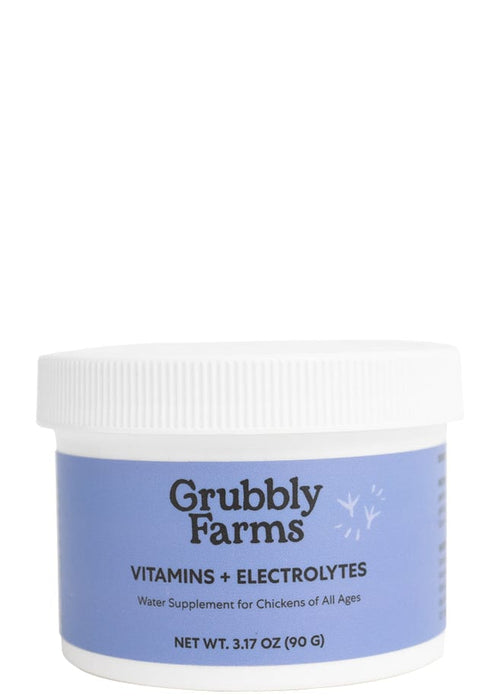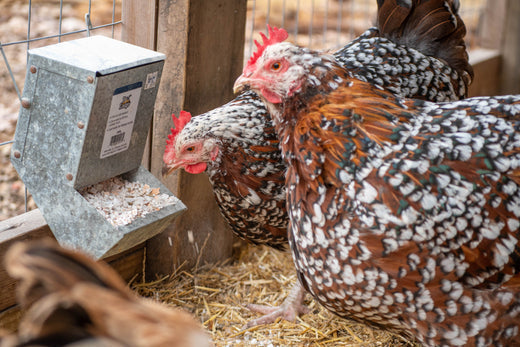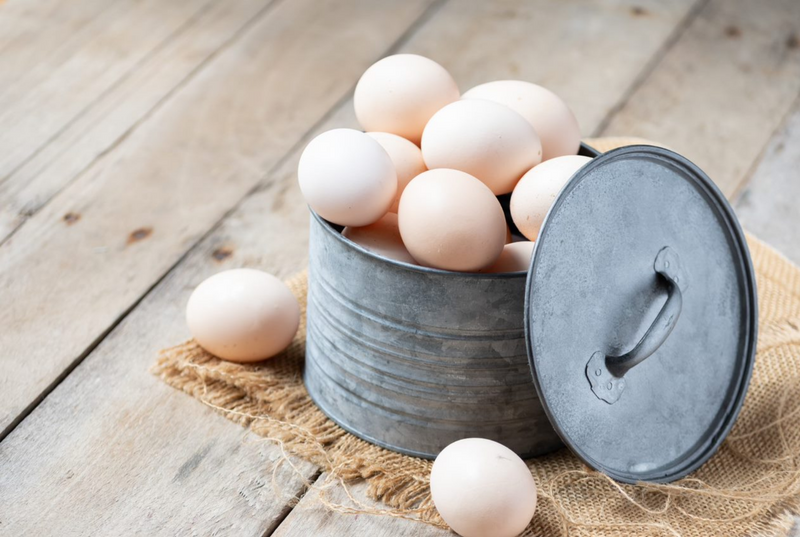If you are a connoisseur of eggs, you may notice that the eggs you collect from your backyard flock can vary in flavor. In some cases, it may be a simple scenario of mind over matter. Simply knowing that the eggs came from your backyard flock can make them taste better than store-bought eggs. However, there are actually seasonal factors that can influence the flavor of your flock’s eggs too. Your flock’s diet, access to forage, and environmental changes can influence egg flavor, as well as the method in which you store the eggs. Let’s take a deeper look into what can cause a hen’s eggs to vary in flavor throughout the year!

What Affects Chicken Egg Taste?
Eggs contain about 100 flavor compounds, most of which are found in the flavor-rich yolk. Chicken eggs are generally described as rich, creamy, and savory. Some people also note a hint of sweetness. However, there can be slight variations in an egg’s flavor that depend on what a hen eats and how she is raised.
The biggest factors that influence egg flavor include:
- Diet
- Environment/Season
- Stress
- Breed
A hen’s diet is the most obvious factor that can affect egg flavor. While the nutrition in a hen’s diet is key for producing healthy eggs, certain elements also influence taste—not just nutritional value.
Environmental conditions can affect egg flavor by changing what and how much a hen eats. Additionally, the storage environment in which the egg is kept after being collected from the coop can also impact the flavor of the egg.
Lastly, the amount of stress a hen experiences as well as her breed can influence the flavor of the eggs she lays. Stress can cause changes in a hen’s diet and metabolism. A hen’s breed may determine what genetics she carries that can influence egg flavor.
Keep in mind that there are some factors that you may assume can affect an egg’s flavor but they really don’t. The color of an egg’s eggshell does not dictate the flavor of the egg. Additionally, the age of the egg does not influence the overall flavor of the egg. An old egg will simply have watery contents due to evaporation and a loss of carbon dioxide, which does not affect the flavor compounds of the egg.
Another assumption is that a brightly colored yolk means a more flavorful egg. However, there is no proven evidence that a brighter colored yolk equals a more flavorful egg.
Chicken Diet and Egg Flavor
Diet is arguably the only factor that directly changes egg flavor. Most other influences simply affect how much or what a hen eats, which in turn alters her diet. With that said, let’s see exactly how a hen’s diet can change the flavor profile of the eggs she lays.
Why Diet Plays the Biggest Role in Egg Taste
When a hen consumes food, the nutrients and compounds are used to support normal body processes, including the development and formation of egg yolks and albumen. A hen who consumes a nutrient-dense diet will lay eggs that are rich and nutritious. However, a nutrient-dense diet can also improve the flavor profile of an egg too. The more nutrients that are present, the richer the flavor of the egg.
Some key dietary elements that are responsible for giving an egg its rich, savory flavor are fats and proteins. When a hen consumes the proper amount of healthy fats, her eggs will be richer, have better texture, and it will improve the cooking performance of her eggs.
Protein is needed for all body functions, including the formation of an egg. Protein is essential for the proper formation of the egg yolk and albumen. It helps eggs have a consistent texture and can help improve the overall flavor profile of the egg.
Another dietary element that can play a role in egg flavor is omega-3 fatty acids. When a hen’s diet is rich in omega-3s, her eggs may take on a richer, more ‘buttery’ flavor. However, you can go overboard with omega-3s. Certain foods that are rich in omega-3s can impart a distasteful flavor to eggs when consumed in large quantities.
There are also other foods that, when consumed in large enough quantities, can impart a distinct flavor to a hen’s eggs. Here are some common foods that can change the flavor profile of an egg:
- Garlic & onions
- Fish meal
- Flax meal/oil
- Water-soluble vitamins
Garlic and onions are often thought to change the flavor of an egg. However, these foods would have to be consumed in very large quantities in order for you to notice any flavor differences in a hen’s eggs. Aside from potentially influencing the flavor of a hen’s eggs, large quantities of garlic and onion in a hen’s diet would not be healthy for her either.
Fish meal is another food that is known to change the flavor of an egg. When fishmeal is present in the diet it can make the eggs taste fishy. Fishmeal should not exceed 1% of a hen’s daily diet in order for the fishmeal not to affect egg flavor.
Flax meal, flaxseeds, and flax oil can also be responsible for imparting a fishy or dirt-like flavor to eggs. However, this is only seen in hens who have a certain genetic make-up. Most hens have a gene that enables the hen’s liver to neutralize the enzymes in flax that cause a fishy flavor. Hens who lack this gene may lay eggs that taste fishy when their diet includes flax products.
Water-soluble vitamins (vitamin C and B-vitamins) are an important part of a hen’s diet. However, if a hen’s diet becomes unbalanced and she receives too many water-soluble vitamins, her eggs can take on subtle metallic flavors.
With that said, there are also some vitamins and minerals that can help improve the flavor of a hen’s eggs when they are present in a hen’s diet. Here are some vitamins and minerals that can help enhance egg flavor:
- Vitamin E
- Zinc
- Selenium
- B-vitamin
When a hen is consuming a balanced diet, she should be getting the proper amounts of these vitamins. Proper amounts of B-vitamins can help improve the overall flavor of a hen’s eggs. Vitamin E can help prevent oxidization of the fats in the egg yolk, which helps preserve the flavors provided by those fats. Zinc and selenium can help enhance the savory flavor of an egg.
Can Kitchen Scraps Change Their Flavor too?
A common concern for backyard chicken owners is that the kitchen scraps they give their hens will impact the flavor of the eggs the hens lay. However, most kitchen scraps should not be fed in large enough quantities to have a significant impact on egg flavor.
For example, feeding your hens leftover seafood scraps will not generally cause their eggs to taste fishy or have an off flavor. The same applies to kitchen scraps that contain garlic or onions.

Can you Influence Egg Taste Through Treats?
You cannot generally influence the flavor of your hens’ eggs by feeding them certain treats or kitchen scraps. If you really want to improve the flavor of your flock’s eggs, focus on feeding them a highly nutritious layer feed and use natural supplements, like flaxseeds or kelp, to improve the nutrition in your flock’s diet.
Do Foraged Bugs Change Egg Flavor?
No, foraged bugs and dried bug treats will not affect the flavor of a hen’s eggs. Foraged bugs will add a natural source of protein to a hen’s diet, so that can help improve the overall flavor profile of an egg, but they will not impart a specific flavor to the eggs.
How Egg Taste Changes in Spring, Summer, Fall, and Winter
Noticing flavor changes in your flock’s eggs throughout the seasons could simply be a mind over matter situation, but there are a few seasonal factors that can actually influence the way a hen’s eggs taste. Most of these factors have to do with how a hen’s diet and food consumption changes with the seasons.
Chicken Egg Taste in Spring
You may notice that your flock’s eggs have a richer flavor and brighter yolks during the springtime. This could be because a hen is able to consume fresh greens, foraged bugs, and a more diverse diet than during the fall or winter. Grasses, weeds, and leafy greens can provide supplemental omega-3s which can make for richer-flavored eggs. A springtime change in egg flavor is usually dependent on how much your flock gets to forage or free-range.
Egg Taste in Summer
Once summer hits, you may notice a very slight change in egg flavor. The eggs may not seem as strongly flavored or as rich. This can happen during very hot weather when a hen consumes less feed to reduce the metabolic heat produced by digestion. Heat stress may cause a slight change in egg flavor, and it can cause hens to stop laying as well.
However, you may not notice too much of a change in egg flavor during the summer. If you give your flock seasonal treats, like fresh berries, herbs, wildflowers, and summer garden produce, those foods will add variety to your flock’s diet and help keep their eggs tasting flavorful and rich.

Fall Egg Flavor Changes
During the fall, your flock’s diet may become less diverse. Leafy greens will be less in abundance and your flock may start consuming more grains and carbohydrates in preparation for cold weather. Additionally, fall is usually molting season, which is when you may choose to increase the protein in your flock’s diet.
These dietary changes will probably not have a huge impact on the flavor of your flock’s eggs, but you may notice that your flock’s eggs are not quite as vibrant or rich as during the spring and summer.

Winter Egg Taste
Wintertime egg taste will be very similar to fall. Winter usually means limited forage, fewer leafy greens, and greater reliance on grains, scratch, and supplements. Fatty foods are often incorporated into a flock’s winter diet which can help their eggs retain a rich flavor. Since there is less variety in the diet though, wintertime eggs may taste stronger and have a ‘less fresh’ flavor compared to spring and summer.
Beyond Diet – Other Reasons Eggs Taste Different
Diet is the main reason egg flavor will change. However, there are also other factors that can influence egg flavor in a less direct way. Here are some other reasons why your flock’s eggs may taste different:
- Stress
- Breed
- Egg storage

Seasonal Stress
Seasonal stressors, like cold stress or heat stress, are the most likely causes of stress to influence egg flavor. Heat stress can lead to a decrease in feed consumption. When a hen is not consuming a well-rounded diet, her eggs may become less rich and flavorful. Less protein and fats in the diet are the primary causes for less flavorful eggs.
Cold stress can compromise a hen’s metabolism, which inhibits nutrient absorption and utilization. When a hen is not able to use the nutrients in her diet to their fullest, the flavor of her eggs may be compromised.
Chicken Breed Differences
Breed is not a huge factor in egg flavor, and there is no proven evidence that certain chicken breeds lay more flavorful eggs. However, hens that are bred properly and who have a certain genetic makeup may be more likely to lay eggs that seem to taste richer and more flavorful.
A well-bred laying hen will be able to properly metabolize the nutrients she receives from her diet, and nutrients are essential for a rich flavor profile. Heritage breed chickens are known to have a strong genetic makeup that can make them lay eggs that taste more flavorful and richer than hybrid or commercial-strain chicken breeds.

Freshness and Storage
Another factor that can influence the flavor of eggs is how and where they are stored. An eggshell is naturally porous, which means gases and other small air-borne particles can enter and exit the eggshell. Freshly laid eggs are coated with a bloom, which is a transparent protective coating that adds an extra layer of protection around the eggshell to protect it from bacteria and other pathogens.
Because of the protective bloom, fresh eggs can be stored at room temperature for at least a week. However, you may choose to store fresh eggs in the refrigerator to prolong their shelf life. When kept in the fridge, eggs can absorb any strong odors that are also present in the fridge. This is especially true for eggs that have also been washed prior to being put in the fridge.
While not directly related to storing fresh eggs, one last factor that may change the taste of eggs is the way in which they are cooked. Eggs cooked in a skillet will taste different than eggs baked in the oven or hard-boiled. Additionally, eggs that have been scrambled or that have a high yolk to white ratio tend to be richer and more flavorful since the egg yolk is the most flavorful part of the egg.

How to Enhance Chicken Egg Taste Year-Round
Egg flavor is mostly influenced by the diet that your flock consumes. You can strive to get delicious, flavorful fresh eggs from your backyard flock year-round by implementing these practices:
- Provide a diverse diet (greens, grains, grubs for protein).
- Supplement with herbs for flavor and health.
- Rotate forage space if possible.
- Ensure year-round nutrition.
- Reduce stress through coop management.
A diverse diet is key for flavorful eggs. Give your flock a nutrient-rich feed, like Grubbly Farms Layer feed, to ensure they are getting all the nutrients they need on a daily basis. Nutrient-rich feed won’t contain filler ingredients. Filler ingredients may provide the energy that a chicken needs, but they won’t supply extra nutrition that is helpful for hens to lay nutritious, delicious eggs. You can also supplement the feed with healthy snacks, kitchen scraps, and treats in moderation.
The other factor to focus on is how well your flock is able to utilize and absorb the nutrition they are consuming. Probiotic and prebiotic supplements can help improve gut health, which in turn allows a chicken to better metabolize the foods it consumes.
Keep in mind that once you collect those delicious eggs, proper storage is key to retaining maximum flavor! You can keep unwashed fresh eggs at room temperature for up to a week or store the eggs in the fridge for up to 3 weeks. Make sure you don’t store the eggs next to fragrant or strong-smelling foods in your fridge.
Frequently Asked Questions About Egg Taste
Why Do My Eggs Taste Stronger in Summer?
The eggs your hens lay during the summer may taste stronger and more flavorful because of the varied diet they can consume during the summer. If you allow your flock to free-range or forage, they are supplementing their diet with extra nutrition and protein which can enhance the flavor of the eggs they lay.
Can Diet Make Eggs Taste “Fishy”?
Yes, certain parts of your flock’s diet can make their eggs taste ‘fishy’. The use of fish byproducts (like fish meal) in layer feed is one of the key reasons why eggs may taste fishy. Switch your flock to a layer feed that uses natural protein sources, like Grubbly Farms Layer feed, to avoid fishy tasting eggs.
Flax-based ingredients could be another element in your flock’s diet that is causing fishy tasting eggs. However, this is less common since most hens are able to neutralize the enzyme in flax that can cause a fishy flavor in eggs.
Do Store-bought Eggs Change Flavor like Backyard Eggs?
Generally, store-bought eggs do not change flavor. This is because hens raised for commercial laying purposes are kept on a very specific, non-varied diet year-round. When there is no seasonal change of diet, a hen’s egg will stay pretty uniform in taste.
What’s the Best Feed for Consistent Flavor?
A nutrient-dense feed that uses whole, fresh ingredients will give your flock the best diet for producing flavorful eggs. The feed must have the proper ratio of fats, protein, and carbohydrates as well as be rich in vitamins and minerals that a hen needs. Avoid feeds that contain filler ingredients (like excess corn or soybean products) and fish byproducts. Feeds that contain filler ingredients may result in less flavorful eggs and fish byproducts can impart a fishy flavor to eggs.
Conclusion: Celebrate the Seasonal Egg
Chicken eggs are a delicious, savory food with a dynamic flavor profile. Fresh eggs laid by your backyard flock are a delicacy that is hard to beat! Even though eggs will retain their subtle, savory flavor year-round, certain factors can influence how rich or strong fresh eggs taste. Make sure your flock is receiving a nutrient-rich, varied diet so they can lay the best tasting eggs. Some seasonal changes are unavoidable, so embrace the slight seasonal differences you may notice in your flock’s eggs! Feel free to experiment, observe and share your egg flavor experiences!








